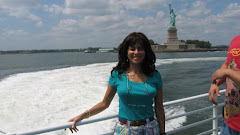
Vacation, play time, and down town to distress are all too important in the lives of the employed. In some cultures, workaholism, inherent in society, discourages the healthy balance between work and play. Is the US too preoccupied with serious activities and work to truly relax and smell the roses? Here is an article that shares the perspective of a woman from Eastern Europe about how busy Americans could benefit from stopping to smell the roses.
Workaholism in America: A European's Perspective by Tijana Milosevic
Coming from Serbia -- a country of six million in Eastern Europe that once belonged to a larger, war-torn entity called socialist Yugoslavia -- I wasn't fully aware of the notion of "career anxiety" when I came to Washington D.C. for my MA degree. Until one evening, that is, at the very onset of the school year. A colleague of mine who was just turning 27 raised his glass and voiced his fear: "Twenty-seven: no serious job and no stable career track."
I was 23 at the time and could not comprehend why anyone would be obliged to have a "career track," let alone a stable one, especially at (what I saw as) the tender age of 27. In fact, I had never entertained the concept the way my American friends were referring to it.
While many Americans move out of their homes when they're 19 to hit college, the East- European model is quite different. Countries are smaller, and if there's any migration it is directed typically towards the capital, so young people continue to live with their families through college. Because of high unemployment rates and poor standard of living, they aren't expected to become financially independent, and many depend on their parents well into their late twenties or even early thirties -- without a sense of shame that such state of affairs entails in the US. These factors reduce the relevance of what Americans often describe as "the treadmill feel" -- an almost compulsive desire for continuous promotions, financial gains, followed by a rise in social status, and an increasing social anxiety.
In societies that are similar to mine, the American model is looked down upon as "harsh capitalistic," "individualistic" and above all "alienated," as American parents are not perceived to provide enough financial and emotional support for their children. In fact my family and friends had observed that I shouldn't have chosen America, since I would probably feel better in Western Europe -- where life is not as fast paced as in the US and capitalism still has a "human face."
For example, Americans still work nine full weeks (350 hours) longer than West Europeans do and paid vacation days across Western Europe are well above the US threshold. The French still have the 35 hour working week, while the hourly productivity is one of the highest in the world. On the other hand, in the US an increasing popularity of employment therapy suggests that a high-paying job still comes first, as job issues "have a huge mental health component," and therapists emphasize the importance of "toxic co-workers and the ramifications of massive layoffs."
Numerous writers have outlined the dangers of isolation and careerism in the American society. In her famous work "Eichmann in Jerusalem," Hannah Arendt equates careerism with a lack of thinking that led to Holocaust: "what for Eichmann was a job, with its daily routine, its ups and downs, was for the Jews quite literally the end of the world. Genocide [...] is work. If it is to be done, people must be hired and paid; if it is to be done well, they must be supervised and promoted."
In Serbia even young and busy corporate-minded career professionals do not have to mark their calendars to meet with close friends. One can always find the time for a spontaneous chat over coffee. Still, this laid back culture is now beginning to change with an increasing development of free market capitalism. I still remember how strange it felt when I first came to DC and had to schedule coffees and lunches with people weeks or even months in advance. I found it odd that people rarely picked up the cell phone (which, granted, could be merely my personal experience, although many Americans confirmed it!) and would often leave the time and date of the call in their voicemails, which implied the other person might not get back to them in a while. I also came to discover that what Americans often referred to as "friends," people from my region would prefer to call "acquaintances." The term "friend" cannot be reserved for someone you meet once in a couple of months and do not know well enough to open up to.
Those experiences bring to mind a memorable line from from "Eat, Pray, Love," a biographical story recently turned into a Hollywood blockbuster starring Julia Roberts: "You Americans know entertainment but you do not know how to enjoy yourselves." Roberts plays a successful thirty-something American who decides to embark on a soul-searching trip to Italy, India and Bali after realizing her job, husband and newly bought house are not what she really wanted from life. Perhaps that's a superficial take on what many would describe as an equally superficial Californian trend to "do something spiritual," but the above quote shows there's something to the American career frenzy that remains unique to the United States. The opportunity cost for "dolce far niente" or "the joy of doing nothing," runs high.
Reflecting on this, I ran into an interesting take on "Eat Pray Love" by a 23-year old blogger: "We are not sympathetic to spiritual personal crises anymore. If you want to have an emotional breakdown about something, you better have a logical, elaborate and secular reason; otherwise you will be dismissed as whiny, annoying and laughable." I wonder if her comment has to do with the lack of experience or the possibility that the generation entering the work force will not have an adequate justification for its desire to escape the treadmill feel -- amidst all the superficial takes on this complex topic.






.jpg)
.jpg)



